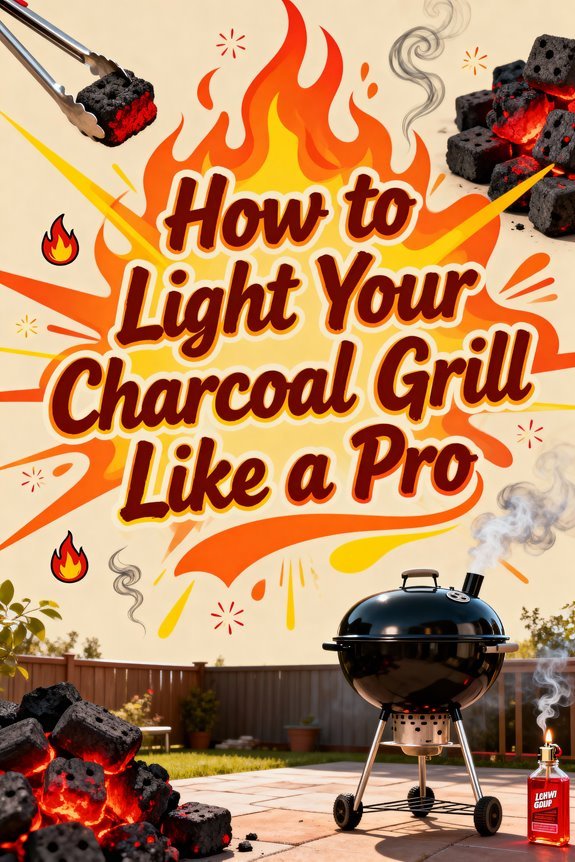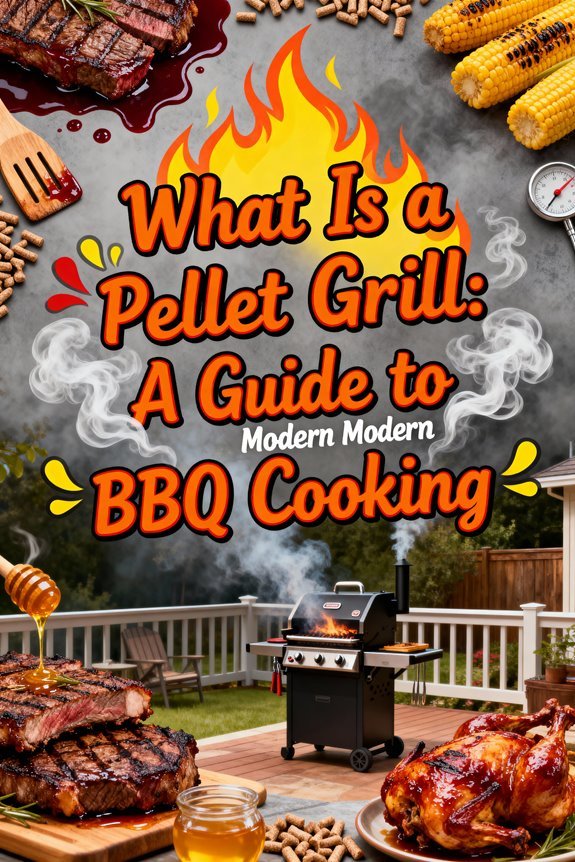To deep clean your Weber grill grates like a pro, start by preheating the grill to 500°F for 15 minutes to soften debris. Remove the grates and scrub them thoroughly with a sturdy stainless steel brush. For stubborn residue, apply Weber Stubborn Stain Remover or create a paste using baking soda and white vinegar. After scrubbing, soak the grates in warm, soapy water with a specialized degreaser. Following these essential steps will set you up for advanced cleaning techniques.
Essential Tools and Materials for Deep Cleaning
Five essential tools form the foundation of a thorough Weber grill grate cleaning: a heavy-duty grill brush, chemical degreasers, manual scraping tools, protective equipment, and auxiliary cleaning supplies.
You’ll need an 18-inch three-sided grill brush as your primary scrubber, complemented by detail brushes for hard-to-reach areas. For optimal cleaning results, heat your grill to 400 degrees Fahrenheit to help soften stubborn residue. Stock up on Weber Stubborn Stain Remover or Grate Grill Cleaner to break down stubborn deposits. Include metal scrapers and scouring pads in your cleaning supplies arsenal for tackling tough carbon buildup. Don’t forget protective gloves and eye protection when working with chemical cleaners. Round out your toolkit with microfiber cloths for final wiping, and a bucket for soaking grates in warm water solutions. Regular drip pan cleaning prevents unwanted pest issues in your grilling area. For professional-grade cleaning results, consider using Weber Exterior Cleaner at $10.99. These scrubber types and supplies guarantee you’re equipped for every cleaning challenge.
Preparing Your Grill for a Thorough Clean
Safety and preparation form the cornerstone of a successful deep clean for your Weber grill. Before you begin, turn off the gas supply completely and allow your grill to cool down fully. Don protective gloves and inspect all gas hoses for potential leaks using a soap-and-water solution. Using a stiff wire brush helps remove stubborn residue from surfaces more effectively. A vinegar solution can help break down tough grease and grime that accumulates over time.
Start by creating a clean workspace with tarps or newspapers to catch debris. Remove the grill grates carefully and set them aside for thorough cleaning. You’ll need to perform a detailed burner inspection, checking for any clogs or damage. Remove the flavorizer bars and heat deflectors to access deeper components. Place a bucket of warm, soapy water nearby for efficient cleaning of removed parts. Don’t forget to empty the grease tray and clear any accumulated ash to prevent fire hazards. Remember to deep clean seasonally to maintain optimal grill performance and longevity.
Step-by-Step Debris Removal Process
To effectively remove debris from your Weber grill grates, you’ll need to begin with a systematic approach that targets both surface and embedded residue. Start by removing the grates entirely from your grill to access all surfaces. Using a putty scraper or plastic scraper, gently loosen large food particles stuck to the grates.
Next, take an 18″ stainless steel grill brush and thoroughly scrape both the top and bottom surfaces, working over a trash bin to contain the mess. This essential step in grill maintenance guarantees you’re starting with a clean slate. Don’t forget to remove and clean any warming racks or secondary grates using the same method. For extremely stubborn residue, a wire cup brush can provide extra scrubbing power. Cleaning while the grates are still slightly warm can help make debris removal easier and more effective. For optimal results, consider using a mixture of baking soda vinegar solution to break down tough grease buildup. This initial debris removal process sets the foundation for deeper cleaning steps and helps maintain your grill’s performance over time.
Tackling Stubborn Grease and Buildup
Dealing with stubborn grease and buildup on your Weber grill grates requires a strategic combination of chemical, mechanical, and heat-based approaches. Start by identifying grease patterns and preheating your grill to 500-550°F for 10-15 minutes to soften stubborn deposits. Regular maintenance will significantly reduce the likelihood of severe buildup and flare-ups during grilling. Always ensure to disconnect propane before beginning any deep cleaning process.
For tough spots, apply Weber Stubborn Stain Remover or a citrus-based cleaner, then use effective scrubbers like an 18″ stainless steel bristle brush for standard grates or a nylon scrubber for porcelain-coated surfaces. Similar to cleaning a George Foreman grill, nonmetallic pads are ideal for protecting surfaces while scrubbing. You’ll need to work both sides of the grates, as buildup often accumulates underneath. For particularly resistant residue, create a paste using white vinegar and baking soda, or seal grates in a plastic bag with oven cleaner for several hours. After cleaning, rinse thoroughly with warm water and dry immediately to prevent corrosion.
Advanced Soaking Methods for Tough Residue
When standard scrubbing won’t cut through stubborn grill residue, advanced soaking methods offer a powerful solution. You’ll want to select a container large enough to fully submerge your Weber grates, such as a deep bucket or adapted PVC pipe setup. For peak residue removal, combine warm, soapy water with specialized degreasers or PBW, letting grates soak overnight. A mixture of Dawn and PBW has proven effective against tough grease buildup during extended soaks. Using natural ingredients like vinegar and lemon juice can provide effective, non-toxic cleaning power while protecting your grill’s surfaces.
Before soaking, lightly brush off loose debris and consider using oven cleaner spray for particularly stubborn areas, waiting 30-60 minutes before immersion. During the soak, periodically agitate the grates to guarantee thorough cleaning. Remember to protect your grates by checking material compatibility first – what works for stainless steel might damage porcelain-coated surfaces. For rust-prone areas, applying a baking soda paste can help break down oxidation before the deep soak. Always wear protective gear and maintain proper ventilation when using chemical cleaners.
Rust Prevention and Maintenance Tips
Since rust poses a constant threat to Weber grill grates, implementing proper prevention techniques will dramatically extend their lifespan. After each use, preheat your grill for 15 minutes, then clean with a stainless steel brush before and after cooking. Never use metal scrapers on porcelain-enameled cast iron grates, as they’ll damage the protective coating. For best results, use mild dishwashing liquid when deep cleaning to avoid corrosive agents. For stubborn residue, create a baking soda paste and gently scrub with aluminum foil balls.
Apply rust resistant oils after cleaning to create a protective barrier against moisture. Use a spray bottle or oiler to distribute a thin, even layer, avoiding excess application. Before deep cleaning, always ensure the gas supply valve is completely shut off for safety. In humid or coastal environments, increase your maintenance frequency and always store your grill with a fitted cover. Watch for early signs of rust or enamel flaking, and address these issues promptly with appropriate stainless steel cleaners. These protective coatings and regular care will keep your grates in ideal condition.
Safety Measures During Deep Cleaning
Before beginning any deep cleaning of your Weber grill grates, implementing proper safety measures protects both you and your equipment from potential hazards. Verify your grill’s completely cool before starting, and keep a fire extinguisher nearby to address any fire hazards. Don’t work near combustible materials, and maintain good ventilation when using cleaning agents. Routine maintenance tasks like cleaning help extend your grill’s lifespan and keep it in top condition.
Always wear appropriate protective equipment, including gloves and eye protection, especially when handling cleaning solutions. Use only food-safe, mild cleaning agents instead of harsh chemicals that can damage your grill or create toxic fumes. Select grill brushes specifically designed for your grate material, and inspect them carefully for loose bristles before each use. Consider switching to bristle-free alternatives with coiled mesh heads to eliminate the risk of wire fragments contaminating your food.
Best Practices for Long-Term Grate Care
To maximize the lifespan of your Weber grill grates, implementing consistent maintenance practices proves essential for peak performance and durability. You’ll need to establish a routine cleaning frequency that aligns with your grilling habits. After each use, run your burners on high for 15 minutes to burn off residue, then brush the grates clean while they’re still hot. Using a stainless steel bristle brush ensures thorough cleaning without damaging the grates’ surface.
For proper grate seasoning, oil your food rather than the grates directly. This approach reduces sticky buildup and simplifies cleaning. A clean grate helps achieve that perfect Cajun sear on salmon and other seafood favorites. For optimal grilling results, maintain grates at low heat temps around 195-200°F when cooking items like baby back ribs. Schedule quarterly deep cleans if you’re a frequent griller, and don’t forget to inspect for damage during these sessions. When storing your grill, verify the grates are completely dry and covered to prevent rust formation. Replace any damaged components promptly to maintain ideal grilling conditions.







